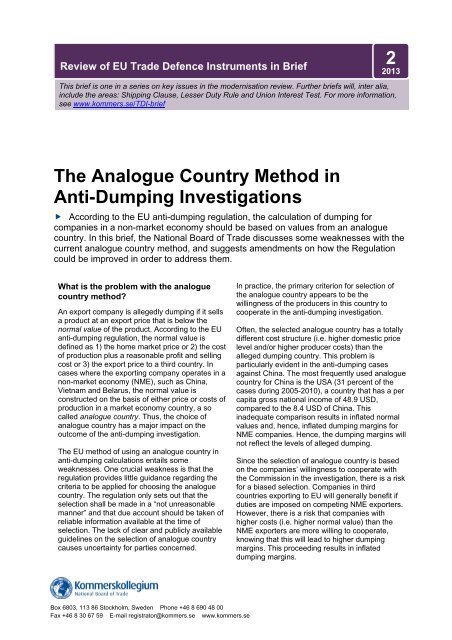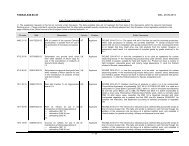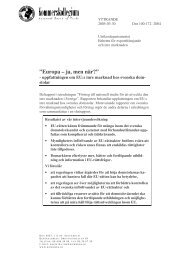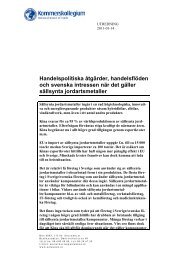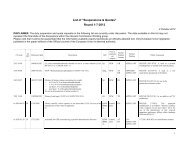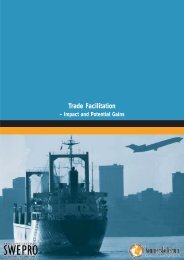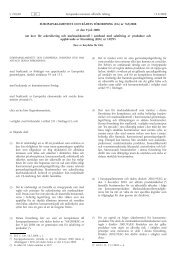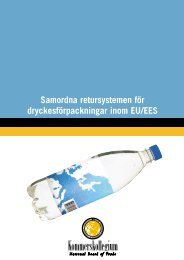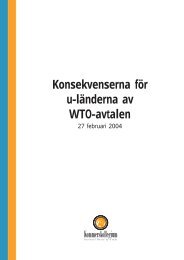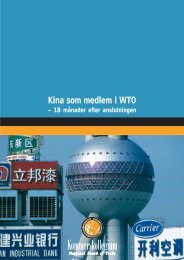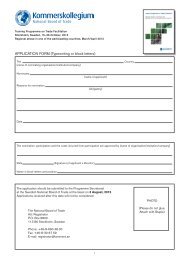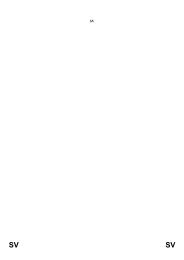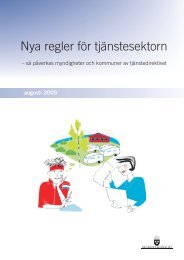2 The Analogue Country Method in Anti-Dumping Investigations
2 The Analogue Country Method in Anti-Dumping Investigations
2 The Analogue Country Method in Anti-Dumping Investigations
You also want an ePaper? Increase the reach of your titles
YUMPU automatically turns print PDFs into web optimized ePapers that Google loves.
Review of EU Trade Defence Instruments <strong>in</strong> Brief<br />
2<br />
2013<br />
This brief is one <strong>in</strong> a series on key issues <strong>in</strong> the modernisation review. Further briefs will, <strong>in</strong>ter alia,<br />
<strong>in</strong>clude the areas: Shipp<strong>in</strong>g Clause, Lesser Duty Rule and Union Interest Test. For more <strong>in</strong>formation,<br />
see www.kommers.se/TDI-brief<br />
<strong>The</strong> <strong>Analogue</strong> <strong>Country</strong> <strong>Method</strong> <strong>in</strong><br />
<strong>Anti</strong>-Dump<strong>in</strong>g <strong>Investigations</strong><br />
Accord<strong>in</strong>g to the EU anti-dump<strong>in</strong>g regulation, the calculation of dump<strong>in</strong>g for<br />
companies <strong>in</strong> a non-market economy should be based on values from an analogue<br />
country. In this brief, the National Board of Trade discusses some weaknesses with the<br />
current analogue country method, and suggests amendments on how the Regulation<br />
could be improved <strong>in</strong> order to address them.<br />
What is the problem with the analogue<br />
country method?<br />
An export company is allegedly dump<strong>in</strong>g if it sells<br />
a product at an export price that is below the<br />
normal value of the product. Accord<strong>in</strong>g to the EU<br />
anti-dump<strong>in</strong>g regulation, the normal value is<br />
def<strong>in</strong>ed as 1) the home market price or 2) the cost<br />
of production plus a reasonable profit and sell<strong>in</strong>g<br />
cost or 3) the export price to a third country. In<br />
cases where the export<strong>in</strong>g company operates <strong>in</strong> a<br />
non-market economy (NME), such as Ch<strong>in</strong>a,<br />
Vietnam and Belarus, the normal value is<br />
constructed on the basis of either price or costs of<br />
production <strong>in</strong> a market economy country, a so<br />
called analogue country. Thus, the choice of<br />
analogue country has a major impact on the<br />
outcome of the anti-dump<strong>in</strong>g <strong>in</strong>vestigation.<br />
<strong>The</strong> EU method of us<strong>in</strong>g an analogue country <strong>in</strong><br />
anti-dump<strong>in</strong>g calculations entails some<br />
weaknesses. One crucial weakness is that the<br />
regulation provides little guidance regard<strong>in</strong>g the<br />
criteria to be applied for choos<strong>in</strong>g the analogue<br />
country. <strong>The</strong> regulation only sets out that the<br />
selection shall be made <strong>in</strong> a “not unreasonable<br />
manner” and that due account should be taken of<br />
reliable <strong>in</strong>formation available at the time of<br />
selection. <strong>The</strong> lack of clear and publicly available<br />
guidel<strong>in</strong>es on the selection of analogue country<br />
causes uncerta<strong>in</strong>ty for parties concerned.<br />
In practice, the primary criterion for selection of<br />
the analogue country appears to be the<br />
will<strong>in</strong>gness of the producers <strong>in</strong> this country to<br />
cooperate <strong>in</strong> the anti-dump<strong>in</strong>g <strong>in</strong>vestigation.<br />
Often, the selected analogue country has a totally<br />
different cost structure (i.e. higher domestic price<br />
level and/or higher producer costs) than the<br />
alleged dump<strong>in</strong>g country. This problem is<br />
particularly evident <strong>in</strong> the anti-dump<strong>in</strong>g cases<br />
aga<strong>in</strong>st Ch<strong>in</strong>a. <strong>The</strong> most frequently used analogue<br />
country for Ch<strong>in</strong>a is the USA (31 percent of the<br />
cases dur<strong>in</strong>g 2005-2010), a country that has a per<br />
capita gross national <strong>in</strong>come of 48.9 USD,<br />
compared to the 8.4 USD of Ch<strong>in</strong>a. This<br />
<strong>in</strong>adequate comparison results <strong>in</strong> <strong>in</strong>flated normal<br />
values and, hence, <strong>in</strong>flated dump<strong>in</strong>g marg<strong>in</strong>s for<br />
NME companies. Hence, the dump<strong>in</strong>g marg<strong>in</strong>s will<br />
not reflect the levels of alleged dump<strong>in</strong>g.<br />
S<strong>in</strong>ce the selection of analogue country is based<br />
on the companies’ will<strong>in</strong>gness to cooperate with<br />
the Commission <strong>in</strong> the <strong>in</strong>vestigation, there is a risk<br />
for a biased selection. Companies <strong>in</strong> third<br />
countries export<strong>in</strong>g to EU will generally benefit if<br />
duties are imposed on compet<strong>in</strong>g NME exporters.<br />
However, there is a risk that companies with<br />
higher costs (i.e. higher normal value) than the<br />
NME exporters are more will<strong>in</strong>g to cooperate,<br />
know<strong>in</strong>g that this will lead to higher dump<strong>in</strong>g<br />
marg<strong>in</strong>s. This proceed<strong>in</strong>g results <strong>in</strong> <strong>in</strong>flated<br />
dump<strong>in</strong>g marg<strong>in</strong>s.<br />
Box 6803, 113 86 Stockholm, Sweden Phone +46 8 690 48 00<br />
Fax +46 8 30 67 59 E-mail registrator@kommers.se www.kommers.se
Today the most frequently used analogue<br />
country for Ch<strong>in</strong>a is the USA, a country<br />
that has a per capita gross national<br />
<strong>in</strong>come that is almost six times higher<br />
than the one of Ch<strong>in</strong>a.<br />
Proposals on how the analogue country<br />
method can be improved<br />
First and foremost, it is important to establish clear<br />
and publicly available guidel<strong>in</strong>es for the selection<br />
of analogue country. This would improve<br />
transparency, coherence and consistency of<br />
practice.<br />
In order to avoid <strong>in</strong>flated dump<strong>in</strong>g marg<strong>in</strong>s, the<br />
guidel<strong>in</strong>es for select<strong>in</strong>g analogue countries for<br />
NMEs should state that:<br />
<br />
<br />
Only market economy countries that are at a<br />
level of economic development comparable to<br />
that of the NME country should be eligible as<br />
analogue countries. Several other countries<br />
(among them India, South Africa, and USA)<br />
have stipulated a similar criterion <strong>in</strong> their antidump<strong>in</strong>g<br />
regulations.<br />
<strong>The</strong> normal value calculations <strong>in</strong> analogue<br />
countries should be based on the analogue<br />
companies’ current home market price or<br />
export price to a third country, and not on<br />
production costs which depend on the<br />
will<strong>in</strong>gness of analogue companies to<br />
cooperate.<br />
<br />
<br />
Products from the analogue country producer<br />
should be similar to the ones produced by<br />
NME country exporters. In this regard,<br />
differences <strong>in</strong> quality and brand names of the<br />
products should be taken <strong>in</strong>to account. Other<br />
criteria to be assessed are the production<br />
processes, production scales and<br />
technologies. <strong>The</strong>se should be similar to those<br />
of the NME country.<br />
In cases where some companies <strong>in</strong> the NME<br />
country have been granted market economy<br />
treatment (MET), it is possible to avoid the use<br />
of an analogue country. In these cases the<br />
normal value for the companies without MET<br />
could <strong>in</strong>stead be based on figures from the<br />
MET companies. This would result <strong>in</strong> a more<br />
accurate and reliable def<strong>in</strong>ition of normal<br />
value, as the figures from the MET companies<br />
are likely to be the best benchmark for the true<br />
normal value <strong>in</strong> the specific case. In addition,<br />
the data from MET companies is already<br />
available to the Commission.<br />
<strong>The</strong> EU's trade defence <strong>in</strong>struments (anti-dump<strong>in</strong>g, anti-subsidy and safeguard<br />
measure) have rema<strong>in</strong>ed largely unchanged for more than 15 years.<br />
<strong>The</strong> Commission has now taken the <strong>in</strong>itiative to modernise the current<br />
<strong>in</strong>struments <strong>in</strong> order to improve their efficiency and effectiveness.


